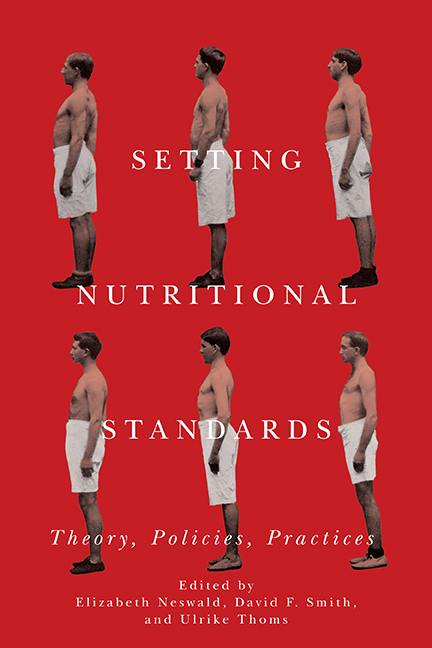Book contents
- Frontmatter
- Contents
- Acknowledgments
- Introduction
- 1 Nutritional Knowledge between the Lab and the Field: The Search for Dietary Norms in the Late Nineteenth and Early Twentieth Centuries
- 2 How Vegetarians, Naturopaths, Scientists, and Physicians Unmade the Protein Standard in Modern Germany
- 3 Of Carnivores and Conquerors: French Nutritional Debates in the Age of Empire, 1890–1914
- 4 Setting Standards: The Soldier's Food in Germany, 1850–1960
- 5 The Quest for a Nutritional El Dorado: Efforts to Demonstrate Dietary Impacts on Resistance to Infectious Disease in the 1920s and 1930s
- 6 “Not a Complete Food for Man”: The Controversy about White versus Wholemeal Bread in Interwar Britain
- 7 “Proscribing Deception”: The Gould Net Weight Amendment and the Origins of Mandatory Nutrition Labeling
- 8 When Is a Famine Not a Famine? Gauging Indian Hunger in Imperial and Cold War Contexts
- Selected Bibliography
- List of Contributors
- Index
8 - When Is a Famine Not a Famine? Gauging Indian Hunger in Imperial and Cold War Contexts
Published online by Cambridge University Press: 18 April 2018
- Frontmatter
- Contents
- Acknowledgments
- Introduction
- 1 Nutritional Knowledge between the Lab and the Field: The Search for Dietary Norms in the Late Nineteenth and Early Twentieth Centuries
- 2 How Vegetarians, Naturopaths, Scientists, and Physicians Unmade the Protein Standard in Modern Germany
- 3 Of Carnivores and Conquerors: French Nutritional Debates in the Age of Empire, 1890–1914
- 4 Setting Standards: The Soldier's Food in Germany, 1850–1960
- 5 The Quest for a Nutritional El Dorado: Efforts to Demonstrate Dietary Impacts on Resistance to Infectious Disease in the 1920s and 1930s
- 6 “Not a Complete Food for Man”: The Controversy about White versus Wholemeal Bread in Interwar Britain
- 7 “Proscribing Deception”: The Gould Net Weight Amendment and the Origins of Mandatory Nutrition Labeling
- 8 When Is a Famine Not a Famine? Gauging Indian Hunger in Imperial and Cold War Contexts
- Selected Bibliography
- List of Contributors
- Index
Summary
Introduction
The World Food Programme predicted a famine would hit Niger in 2005. Even before the locusts came, drought had despoiled millet fields across the southern grasslands. As refugees began to collect around the town of Maradi, the international community mobilized. Doctors without Borders set up six emergency care centers, and the United Nations sent 7,000 tons of food.1 Niger's prime minister, Hama Amadou, traveled to France to appeal for aid. Taking advantage of his absence, the president and Amadou's political rival, Mamadou Tandja, assembled the press corps to announce there was “no famine” and “the people of Niger look well-fed.”2 The denials split the aid community. The Swiss aid agency agreed that the crisis had been overplayed, finding “a big gap between the reality facing us on the ground and what the international community is saying.”3 The United States, which was arming and training Niger's military, disputed the United Nation's figures.4 As the catastrophe unfolded, so did the debate. In 2008, social scientists were still working on models to determine whether a famine had occurred.5
Denials of this kind are not unusual. They predictably follow an international relief appeal that incorporates the word “famine.” When international organizations raised concerns in 2008 about mass starvation in Ethiopia, the government of Meles Zanawi issued a statement affirming that “famine does not exist in Ethiopia. It is a story made up by the foreign media and aid organizations.”6 Earthquakes, floods, and hurricanes provoke intense debates about environmental causes, the responsibility of governments, and the geography of need, and so it might be said that all disasters are politically constructed, but the narration of famine contains a further degree of subjectivity, a determination of whether an emergency exists at all. Decisions to declare or not declare may cost lives. Failure to announce a famine may delay a response until it is too late, but a premature or mistaken declaration invites a kind of collateral damage by causing thousands to gather at relief camps where they fall prey to disease.
- Type
- Chapter
- Information
- Setting Nutritional StandardsTheory, Policies, Practices, pp. 195 - 212Publisher: Boydell & BrewerPrint publication year: 2017



